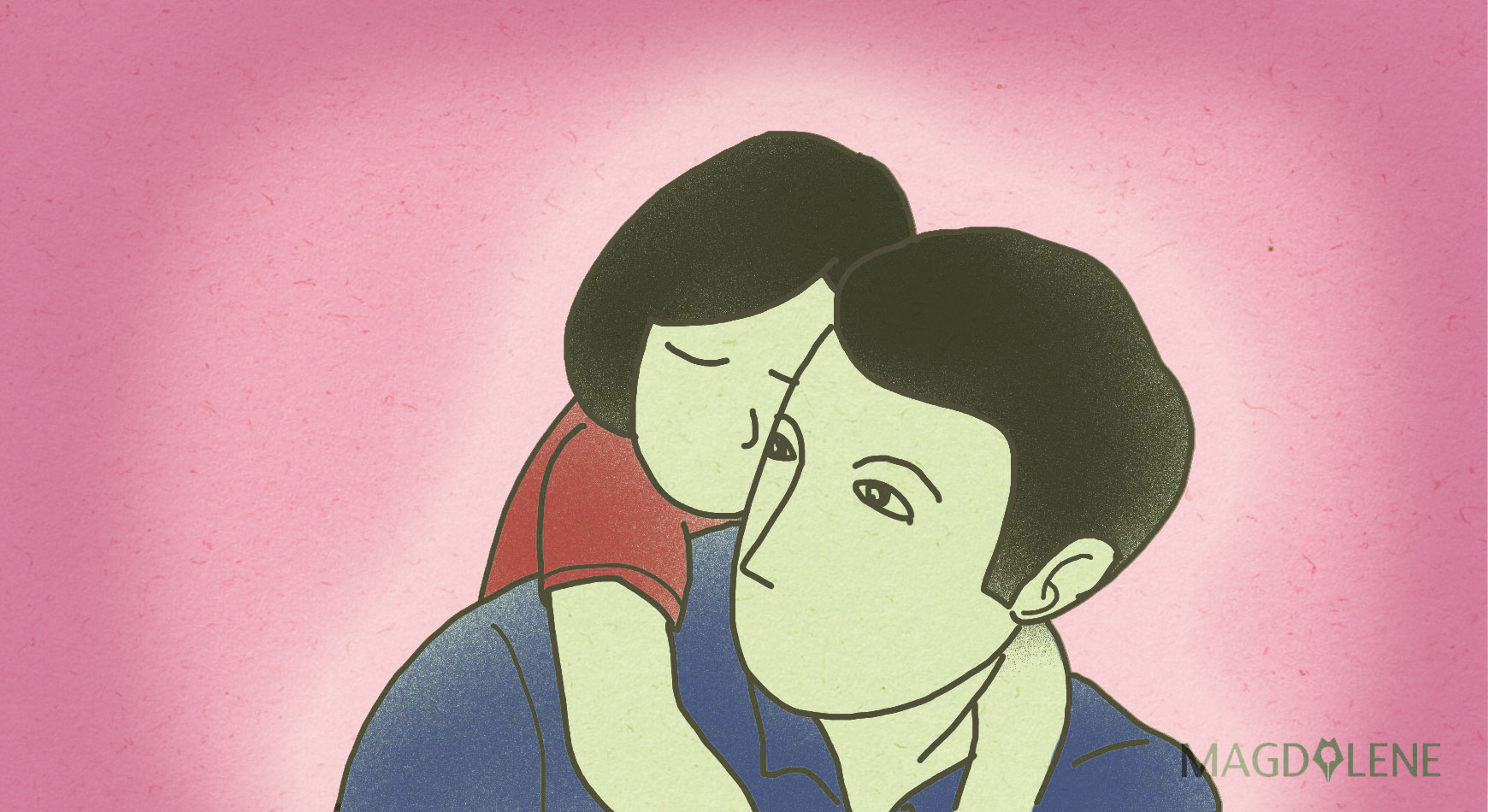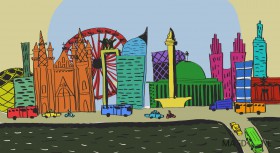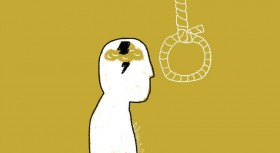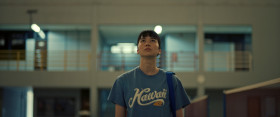For the longest time, I had been yearning for summer. During April and May, there had only been hints of what could be, false promises of sun-kissed days and glorious, lingering summer nights. But as I was standing at my father’s grave, arms linked with my mother and sister, exposed in bright sunlight and without any trees nearby to offer shade, I cursed the sun.
How dare you show your face today, the day we are burying my father? This is not a bright and beaming affair. It’s a goddamn tragedy, and I’d rather have heavy clouds, rainfall or a raging thunderstorm accompany me.
I recently read a book about Circe, the daughter of sun god Helios. Because of her dark powers – witchcraft – the Olympian gods, Zeus in particular, feel threatened and decide to banish her. It is Helios himself who takes her to the deserted island in his golden chariot. As soon as Circe’s feet touch the ground, he turns around and leaves her, without so much as one last glance.
I had not been banished, but I understood Circe’s terror of being abandoned by the one who should love her the most. I watched the urn containing my father’s ashes vanishing in a hole in the ground. In the midst of my remaining family and other mourners, I was entirely alone. From this day on, I was a daughter without a father, like Circe. Of course, my father had not turned his back on me voluntarily. He had simply died. Such is the fate of mortals.
The last book my father read before being hospitalized was “The Mirror And The Light” by Hilary Mantel. To this day, it still sits on the little side table next to the orange armchair in the living room, where he used to spend his afternoons and evenings. I stare at it sometimes and feel like it’s staring back at me. Come and pick me up. Come on, you can do it. It’s a thick book, a Christmas present from my mother, the final installment in Mantel’s trilogy about the rise and fall of Thomas Cromwell. A bookmark is nestled in between the pages 428 and 429.
In the midst of my remaining family and other mourners, I was entirely alone. From this day on, I was a daughter without a father, like Circe. Of course, my father had not turned his back on me voluntarily. He had simply died. Such is the fate of mortals.
My father and I loved to read historical fiction and non-fiction revolving around King Henry VIII, his six wives, and the politics, power and intrigue at his infamous court. We’d trade books we enjoyed reading and discussed them at length. Sometimes, we fed each other with little details we had learned.
Did you know that there’s a rhyme British kids learn at school to help them remember the fate of each wife? Divorced, beheaded, died; divorced beheaded, survived.
Did you know that Catherine Howard asked for the executioner’s block to be brought to her prison chamber in the Tower of London one night before her beheading, so she could practice how to place herself on it the next day?
Did you know that in later years, the ulcers in Henry VIII’s legs were kept open and weeping and, as a result, emitted a vile smell, which led his servants to perfume his chambers and flood it with flowers to cover the scent?
I had phases where I was obsessed with different literary genres and themes – Henry VIII was one, books from and about India another. I still call The Far Pavilions by M.M. Kaye, a sweeping saga of love and war set against the backdrop of British-Indian history, my literary home. It was also one my father’s favorites. I then urged him to read Arundhati Roy and Jhumpa Lahiri. Later, when I was many years past my own adolescence, I rediscovered young adult fiction, a genre I knew my father would take no interest in. And yet, one day, I saw him ordering a copy of John Green’s “The Fault in Our Stars”, and then asking me if we should watch the movie together.
*
I’m wearing my father’s house shoes. His feet were only slightly bigger than mine. I had a pair of my own house shoes that I kept at my parents’ house. My sister and I live just around the corner but spend so much time there – not because we feel obligated to, but because we actually enjoy each other’s company. We always were a close-knit family, and even when we were living on different continents, we found a way to stay connected. Jauh di mata, dekat di hati. That’s what Indonesian people say, even though there is a physical distance and we can’t see one another, we remain close at heart. My mother is from Indonesia.
For my birthday last year, my parents gave me new house shoes because mine were old and battered, although I always insisted they could be worn a little bit longer. The new pair looked almost exactly like my father’s. Thus began the regular mix-up.
“Papa, are you wearing my shoes again?”
My father would look at his feet, amused, his head tilted slightly to the side. “Why yes, I guess I am. I was already wondering why they didn’t seem to fit as perfectly as they normally do.”
“Switch?” And then we’d both laugh, kick off our shoes and slip into the right pair.
When he was in hospital, my house shoes, the new ones, went kaput – hilariously bad quality – but I couldn’t be bothered to get yet another pair. Since my father wasn’t around, I simply borrowed his. I visited him at the palliative care unit and said: “Papa, I have to tell you something.”
He looked at me, alarmed. He used to look at me that way when I was younger and had screwed up, like the one time when I was caught smoking during a school trip, or when I tanked one of my final exams at university.
“I’m wearing your house shoes now, exclusively.”
He smiled. But it was a sad smile – the only smile we all had left now. “That’s quite alright. I don’t think I’ll be needing them anymore.”
Sometimes, I aimlessly wander through my parents’ house. When I reach their bedroom, I cautiously approach the side of the bed where my father used to sleep – the right side by the window, closer to the bathroom – and glance at the nightstand, recognizing his things: his glasses, the little silver box he used to keep his pills, a black alarm clock, a framed photograph.
It’s the glasses that make me choke. I instantly remember the movie My Girl, where Vada sees her best friend Thomas J lying in an open casket and starts crying: Where are his glasses? He can’t see without his glasses! It sounds ridiculous, but I finally understand where she’s coming from. My father always wore glasses, they were such a familiar feature on his face. Now they look lost, ownerless, almost sad. And wherever my father may be right now, can he see without his glasses?
*
I recently started a new job. When I was invited for an interview, my father was still alive. Barely, but still breathing, heart beating, confined to his bed, his mind often muddled due to the morphine injections that helped to ease his pain. But I could tell that he heard me when I sat next to him, holding his hand, asking him to keep his fingers crossed. There was something in the way he looked at me, with clarity in his eyes. My sister told me later that he had indeed kept his fingers crossed the whole time while I was gone.
My father passed away on a Friday morning, and on Monday next, I received the phone call: they had been pleased with my interview and would like to offer me the job. An ocean of relief and joy washed over me, quickly followed by a sharp pain, because the person I wanted to tell first was already gone.
Later, when I sat at my desk, the door closed, and sifted through a pile of documents and my email inbox, I was ashamed of myself. Why would I feel embarrassed? My father died. I was grieving. If anything, I should count myself lucky that I miss him the way I do – a testament to the relationship we had.
One month later, I stepped into my new office, poised and neatly dressed, hair styled, ready to throw myself into strange surroundings and impress my colleagues and superiors who were warm and welcoming. And yet, the first thing I needed to mention was my father’s death.
I’m very glad to be here, and I’m sorry to bring this up in our first meeting, but my father passed away recently, and his funeral will take place next Monday. Would it be possible to get a day off? No, it happened five weeks ago, but due to the pandemic, we had to wait for an empty slot at the cemetery.
Bewildered faces, followed by genuine sympathy – they were nothing but understanding and sweet about my situation, yet I couldn’t help but feel embarrassed, uncomfortable. Later, when I sat at my desk, the door closed, and sifted through a pile of documents and my email inbox, I was ashamed of myself. Why would I feel embarrassed? My father died. I was grieving. If anything, I should count myself lucky that I miss him the way I do – a testament to the relationship we had.
And yet, whenever I have to talk about losing him, whenever his death comes up in casual conversations, I quickly go through the motions – yes, he passed away recently, it’s been very hard for us all, we were very close, oh yes, it was a great comfort that we were with him at the end – and then excuse myself, so I can hide in the nearest bathroom and try my best not to burst into tears. You can always tell when I have cried, my eyes are puffy and swollen even hours later, and I can’t stop sniveling.
*
On my father’s birthday, we met his best friends for dinner at the lovely Italian restaurant in our neighborhood. It was the first birthday party I attended where the guest of honor wasn’t around. Deceased. It felt almost morbid to order the seared fish with vegetables from the menu of the day and a glass of white wine.
Yet, I couldn’t help but think that he was there with us. I’m not always so sure. Most of the time, I doubt.
The other day, I took my dog Milo for a walk around the Botanical Gardens, my father’s preferred route for a longer walk on the weekends. We often took walks together. Years ago, after his first major surgery, his body was still weak, but as he slowly recovered, we resumed our afternoon walk routine. Short distances at first, then longer ones.
The journey around the Botanical Gardens leads through a posh, residential neighborhood. We used to stare at the villas and luxurious houses, wondering how they looked like inside, imagining spacious libraries, cozy attics and luxurious bathrooms as big as my whole apartment.
While I was walking the streets, my dog happily marking the territory by peeing on every tree and bush, there it was again, that feeling that my dad was with me, in spirit at least.
Send me a sign, I thought. My mother often says, I wish he would give me a sign that he’s still around, somewhere, somehow. I never know how to react. But in that moment, I wanted a sign, too.
And then, the clouds parted. The warmth of the sunlight gently touched my face. Maybe it didn’t really happen like this, maybe it was wishful thinking more than anything else – however clear this recent memory is imprinted in my mind. But maybe, just maybe, my father was up there, calling in a favor with Helios.
Let me show my daughter that I’m still by her side, that I’m watching over her. Don’t you think you should grant me this request, seeing how you failed your own child?
Of course, my father would never be so bold as to provoke the sun god. If I have learned anything from reading novels inspired by Greek mythology, it’s that the Gods are cruel and in their endless wraths play with the lives of mortals, to have a little amusement as they float through eternity, simply because they can. Thinking about my father, a mortal, challenging the sun god Helios, however, made me smile. If only a little bit.







Comments